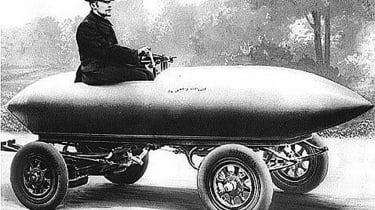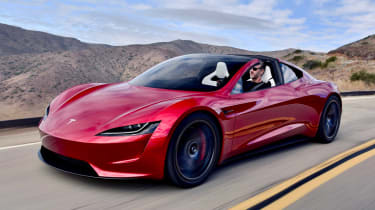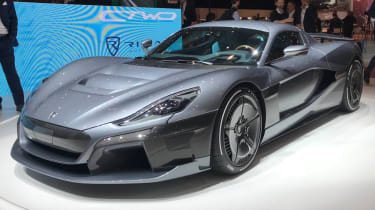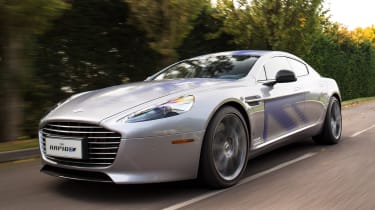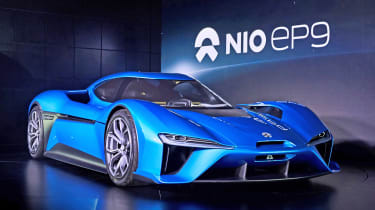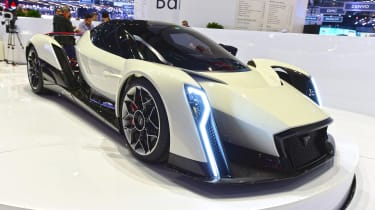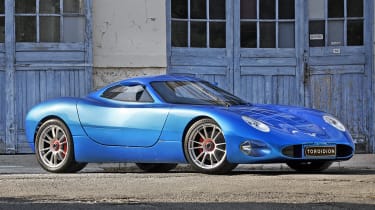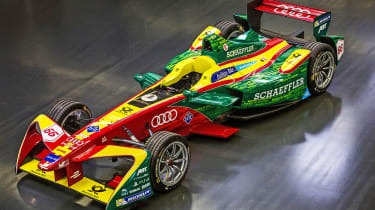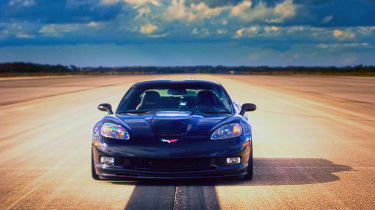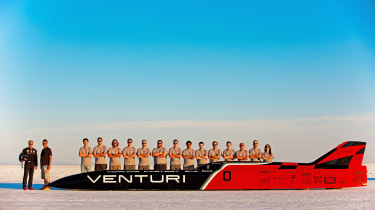We pick 10 of the fastest electric cars the world has ever seen
Electric cars are making in-roads into the dominance of the internal combustion engine, and today there are more electric vehicles (EVs) on sale than ever in a variety of sectors. Another clear sign that EV technology is progressing is the rise in the number of manufacturers aiming to break speed records, as well as produce the world's fastest electric car. What's more, the importance of EVs has seen an influx of mainstream car makers announcing entry into the Formula E electric single-seater championship at the expense of other racing programs.
There was a time when a fast electric car meant a radio-controlled scale model. But today there are a variety of full-size speed machines on sale. At the moment, most high-performance EVs are exclusive models built with six or seven-figure purchase prices, and here we round them up, along with some other record-holding models that aren't quite in the realms of production. Our list comprises one of the world's first Land Speed Record cars, plus a machine that can lap the Nurburgring Nordschliefe like a GT3 racer and some models designed with record breaking in mind.
Best electric cars to buy 2020
The development of electric cars kicked off along with the birth of the motor car at the turn from the 19th to the 20th Century when makers were experimenting with different types of motive power – even steam power was considered by some as a potential power source. But once internal combustion engines gained a foothold, EV development fell by the wayside.
Now that car makers are realising that electricity is going to be the only way to meet ever-stricter emissions laws, the pursuit of records and more electric motorsport will only accelerate EV development. Breakthroughs in these areas will eventually filter to production cars, and one day it's entirely feasible that EVs will deliver the same kind of performance and range that buyers are accustomed to from conventional power sources, as well as the shortest of recharging times.
At the moment, the variety of cars vying for assorted electric car speed records is diverse. Here we feature 10 cars that defy anybody's preconception that EVs are dull…
The world's fastest electric cars
La Jamais Contente
- Top speed: 66mph
- 0-62mph: N/A
Our list kicks off with the first fast electric car – La Jamais Contente (Translation: The Never Satisfied). This was the electric car made in Belgium (of all places!) that set the World Land Speed Record (LSR) in 1899 at a nosebleed-inducing 66mph. It was the first car, with driver Camille Jenatzy at the wheel, to break an existing record, which incidentally was set by a different electric car a month earlier.
The torpedo-shaped body was quite aerodynamic for the time, as it was made of a mix of aluminium and magnesium. But the separate chassis it was bolted to and prone driving position negated any positive effect it could've had.
The Belgians held the LSR for three years before it was bettered by a real automotive cul-de-sac, a steam-powered car that did 75mph. Later in 1902 a petrol-powered car went 1mph faster than that, then another steam car blitzed that record by hitting 128mph. However, after that petrol power took a foothold, before the jet and rocket-powered LSR age.
Tesla Roadster
- Top speed: 250mph+
- 0-62mph: 1.9 seconds (est)
While the Tesla Model S is the halo car for the electric revolution, Tesla is still making headlines with other models in the range. While an original Tesla Roadster was recently fired into space, the Mk2 model was launched by rolling off the back of the new semi truck. The original Tesla Roadster used technology from Lotus to further EV development, but the new model is set to be one of the world's fastest cars when it arrives in 2020.
A lot of the figures surrounding the new Tesla Roadster are estimates, and they are barely comprehensible as being made by a production car. The four-seater will have three electric motors – one front and two rear – so it will have four-wheel drive, and while maximum power hasn't been revealed, a torque figure of 10,000Nm should help the machine achieve its 1.9-second 0-62mph time. That puts the Roadster ahead of the hypercar pack, while a top speed 'in excess' of 250mph is promised. Use the car's performance to the max and the range will suffer, but Tesla has packed the Roadster with higher density batteries than the Model S and Model X, giving it an estimated range of 620 miles.
A price tag of £200,000 is reasonable when you consider how much the other electric cars in our list cost. We'll just have to wait and see if the Roadster can live up to the performance claims when it finally arrives in 2020.
Rimac C_Two
- Top speed: 258mph (est)
- 0-62mph: 1.85 seconds (est)
The Rimac Concept One will be familiar to viewers of The Grand Tour, as it was the car that Richard Hammond crashed in Switzerland. Undaunted by the accident – and maybe courtesy of the publicity – Croatian car maker Rimac has returned with its next hyper car, the C_Two.
It was developed from a blank sheet of paper (so no parts are carried over from the Concept One), and the new car has Tesla Roadster-rivalling performance figures, not that the Concept One was anything like slow. Power is 1,888bhp from the four in-wheel electric motors and there is 2,300Nm of torque, which means the C_Two can do 0-62mph in 1.85 seconds (with a one-foot rollout) and hit 258mph flat out.
There's some hi-tech energy storage on board, too, as the C_Two gets a 120kWh lithium manganese nickel battery pack, and this can be recharged to 80 per cent in just half an hour. With a full charge you can travel up to 400 miles, although not necessarily at 258mph. There's a host of hi-tech features, too, including Level 4 autonomous driving, a driver coach to teach owners the right racing lines at race tracks across the world and facial recognition to lock and unlock the car.
The C_Two's performance figures compare favourably with the Concept One, which had 1,224bhp, 1,600Nm and a 210-mile range. The Concept One's acceleration was the subject of a number of YouTube drag race battles, so we can expect a repeat with the C_Two. The big drawback is that the new Rimac comes with a price tag that makes the new Tesla Roadster seem cheap (if you have to ask, you can't afford it), although that hasn't stopped buyers across the globe from snapping them up.
Aston Martin RapidE
- Top speed: 155mph
- 0-62mph: 3.0 seconds (est)
British prestige marque Aston Martin is going fully electric with its four-door grand tourer. The RapidE ditches the traditional big-capacity V12 in favour of an electric motor/battery set-up co-developed with the technology division of the Williams Formula One team.
This means it'll have Tesla-rivalling performance figures, and bosses have said it'll deliver a unique driving experience unlike any V8 or V12-powered Aston. However, the RapidE will be just as luxurious as its ancestors inside, thanks to the hand-finished interior and bespoke materials used.
Nio EP9
- Top speed: 194mph
- 0-62mph: 2.7 seconds
Here's an EV that looks more like a full-size R/C car than average. The EP9 is the flagship model for Chinese electric car start-up Nio, and it's similar in concept to Rimac's car. It has in-wheel motors for four-wheel drive, and it makes 1,341bhp in total. Nio claims a range of 265 miles, which was better than the Concept One, although Nio has added the ability to swap batteries for fully charged replacements (another nod to the world of R/C cars) in just eight minutes.
Under the skin, the carbon fibre chassis is built to Le Mans specification, while an active suspension system keeps things level. This combination of tech meant the EP9 lapped the Nurburgring Nordschleife in 6:45s to make it one of the fastest production cars of any type, rubbing shoulders with the likes of the Lamborghini Huracan Performante and Porsche 918 Spyder.
And yes, it is a production car, as six have been sold, while another 10 will be built, albeit for £1million each.
Vanda Dendrobium
- Top speed: 200mph
- 0-62mph: 2.7 seconds
If you thought Croatia was a strange country for an electric supercar to come from, how about Singapore? With its tight city streets, there isn't much space for a supercar to stretch its legs, but with sky-high vehicle running costs a fact of life in Singapore, owning a car is seen as a status symbol, and a million dollar supercar will still have its buyers.
The Dendrobium (named after a rare orchid) is the product of tech firm Vanda Electrics, and like the forthcoming Aston Martin RapidE luxury car, F1 team Williams has a hand in its motive power. It's reported to have the benchmark 1,000bhp power output, and it certainly looks like it'll hit 200mph, too.
Production is still being considered at this point in time, but a seven-figure price tag should be expected.
Toroidion 1MW
- Top speed: N/A
- 0-249mph (400km/h): 11 seconds (est)
The Dendrobium does at least move under its own power, but with the Toroidion 1MW, there's debate as to whether that is the case. From that other renowned supercar country, Finland, the 1MW is another electric supercar start-up that promises huge power and performance from an electric drivetrain – they've even hired ex-F1 star Mika Salo as a consultant.
However, apart from a couple of appearances in London and Monaco a few years back, the Toroidion hasn't gone much further. That's a shame, because it's arguably one of the best looking electric sports cars we've seen.
Spark-Renault SRT_01E (Formula E)
- Top speed: 140mph
- 0-62mph: 3.0 seconds (est)
It's the car you know as the single-seat Formula E racer, and it's going to be even more relevant to motorsport over the coming years. While the Formula E series started small, manufacturers such as DS and Jaguar have already joined, while Audi, Mercedes and Porsche are dropping their conventional motorsport programmes in favour of works teams in the all-electric series.
The Spark-Renault chassis was created by Italian single-seater expert Dallara, while the original electric motor was the same as the one found in the McLaren P1 hypercar, although rule changes mean that teams can now develop their own motor systems. Batteries came from Williams, British firm Hewland provided the gearboxes and Michelin supplied the treaded tyres on 18-inch wheels.
The car's 900kg weight means it can sprint from 0-60mph in around three seconds, while the short, tight street circuits the cars race on are designed to deliver close, entertaining racing. With the arrival of major manufacturers to the series, it can only be a matter of time before we see longer, faster races and close on-track action.
Genovation GXE
- Top speed: 209mph
- 0-62mph: 3.0 seconds (est)
Want to know what the world's fastest EV is? You're looking at it. But it looks like a C6-generation Corvette?, we hear you say. That's because Genovation has based its EV on the legendary US sports car.
While the GXE's bodywork is likely to raise a few eyebrows at General Motors, the chassis and running gear are all Genovation's own. There's aluminium construction to counter the weight of the batteries, and while they only give a range of around 120 miles, there is genuine 200mph ability from the car.
Production models will be based on the current C7 Corvette Stingray, but with a $750,000 (£575,000) price tag, it's either a really expensive 'Vette, or a bargain compared to the seven-figure models in our top 10.
Buckeye Bullet 3
- Top speed: 340mph
- 0-62mph: N/A
Credit: Shiv Gohil / Spacesuit Media
Going for fast 0-60mph times is quaint, when you compare to the top speed achieved by the Buckeye Bullet, the world's fastest electric vehicle. This streamlined racer was created by Ohio State University with help from French firm Venturi, and took to the Bonneville Salt Flats in September 2016 to set a new electric Land Speed Record of 342.144mph. To put that into context, the first internal combustion-engined car to break 340mph did it back in 1938…
The Bullet is a one-off machine with the front and rear axles powered by two electric motors each, and with the cockpit set low between the axles. It has a two-speed transmission, with first gear suitable for speeds up to 275mph.
While 342mph is the current record, further attempts will eventually see the Bullet break 400mph. In addition, the team behind the Bullet is also developing a hydrogen-powered streamliner.
How fast can production electric cars get? Let us know your thoughts in the comments…
Get the latest electric car news, reviews and analysis on DrivingElectric.com
Source: Read Full Article


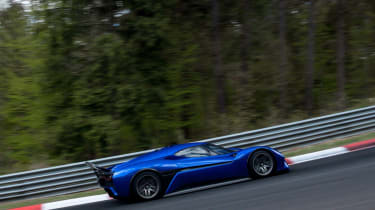
 Best electric cars to buy 2020
Best electric cars to buy 2020